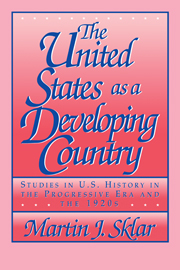 The United States as a Developing Country
The United States as a Developing Country Book contents
- Frontmatter
- Contents
- Preface
- I Periodization and historiography: The United States considered as a developing country
- II Studying American political development in the Progressive Era, 1890S–1916
- III Dollar Diplomacy according to Dollar Diplomats: American development and world development
- IV Woodrow Wilson and the developmental imperatives of modern U.S. liberalism
- V Some political and cultural consequences of the disaccumulation of capital: Origins of postindustrial development in the 1920s
- VI Disaffected with development: Henry Adams and the 1960s “New Left”
- VII The corporate reconstruction of American capitalism: A note on the capitalism–socialism mix in U.S. and world development
- Index
IV - Woodrow Wilson and the developmental imperatives of modern U.S. liberalism
Published online by Cambridge University Press: 03 February 2010
- Frontmatter
- Contents
- Preface
- I Periodization and historiography: The United States considered as a developing country
- II Studying American political development in the Progressive Era, 1890S–1916
- III Dollar Diplomacy according to Dollar Diplomats: American development and world development
- IV Woodrow Wilson and the developmental imperatives of modern U.S. liberalism
- V Some political and cultural consequences of the disaccumulation of capital: Origins of postindustrial development in the 1920s
- VI Disaffected with development: Henry Adams and the 1960s “New Left”
- VII The corporate reconstruction of American capitalism: A note on the capitalism–socialism mix in U.S. and world development
- Index
Summary
Most persons are so thoroughly uninformed as to my opinions that I have concluded that the only things they have not read are my speeches.
Woodrow Wilson, 1912Perhaps the greatest source of historical misconception about Woodrow Wilson is the methodological compartmentalization of his mentality into two distinct components, the “moralistic” and the “realistic” or “commercialistic,” as if they were discrete and mutually exclusive. From this point of departure, if one thinks or acts “moralistically,” he cannot be considered capable at the same time of thinking and acting “realistically,” at least not consistently: If one is a “moralist,” his political behavior can be considered as deriving only secondarily, if at all, from an understanding of, or a serious concern for, the affairs of political economy.
According to this approach, wherever Wilson is perceived to have spoken or acted for the “little man,” “democracy,” “liberty,” “individual opportunity,” and the like, he was “liberal” and moralistic; wherever he is perceived to have spoken or acted for corporate interests, economic expansion abroad, and the like, he was “conservative,” “commercialistic,” “expedient,” or realistic. Where Wilson supported measures promoting large corporate interests at home or abroad, he is considered to have forsaken his moralism, to have been driven by political expediency, personal egoism, or implacable social and economic forces, or to have gathered the unintended consequences of a misdirected moralism. In this view, Wilson the moralist is generally considered the true type, and Wilson the realist, the deviant.
- Type
- Chapter
- Information
- The United States as a Developing CountryStudies in U.S. History in the Progressive Era and the 1920s, pp. 102 - 142Publisher: Cambridge University PressPrint publication year: 1992
- 5
- Cited by


